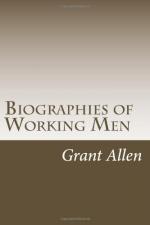to carry on the farm for many years. Only those
who know the hard toil of a raw American township
can have any idea what that really means. A
farmer’s work in America is not like a farmer’s
work in England. The man who occupies the soil
is there at once his own landlord and his own labourer;
and he has to contend with nature as nobody in England
has had to contend with it for the last five centuries
at least. He finds the land covered with trees,
which he has first to fell and sell as timber; then
he must dig or burn out the stumps; clear the plot
of boulders and large stones; drain it, fence it,
plough it, and harrow it; build barns for the produce
and sheds for the cows; in short,
make his farm,
instead of merely
taking it. This is labour
from which many strong men shrink in dismay, especially
those who have come out fresh from a civilized and
fully occupied land. For a woman and a boy, it
is a task that seems almost above their utmost powers.
Nevertheless, Mrs. Garfield and her son did not fail
under it. With her own hands, the mother split
up the young trees info rude triangular rails to make
the rough snake fences of the country—mere
zigzags of wood laid one bit above the other; while
the lad worked away bravely at sowing fall and spring
wheat, hoeing Indian corn, and building a little barn
for the harvest before the arrival of the long cold
Ohio winter. To such a family did the future
President originally belong; and with them he must
have shared those strong qualities of perseverance
and industry which more than anything else at length
secured his ultimate success in life.
For James Garfield’s history differs greatly
in one point from that of most other famous working
men, whose stories have been told in this volume.
There is no reason to believe that he was a man of
exceptional or commanding intellect. On the contrary,
his mental powers appear to have been of a very respectable
but quite ordinary and commonplace order. It
was not by brilliant genius that James Garfield made
his way up in life; it was rather by hard work, unceasing
energy, high principle, and generous enthusiasm for
the cause of others. Some of the greatest geniuses
among working men, such as Burns, Tannahill, and Chatterton,
though they achieved fame, and though they have enriched
the world with many touching and beautiful works,
must be considered to have missed success in life,
so far as their own happiness was concerned, by their
unsteadiness, want of self-control, or lack of fixed
principle. Garfield, on the other hand, was not
a genius; but by his sterling good qualities he nevertheless
achieved what cannot but be regarded as a true success,
and left an honourable name behind him in the history
of his country.




